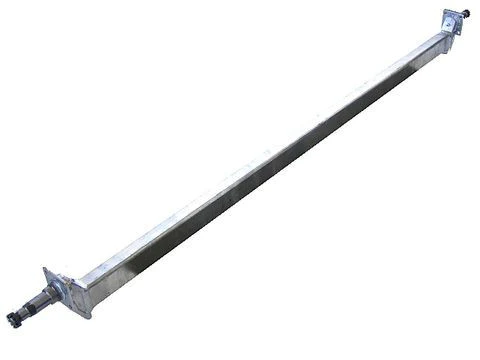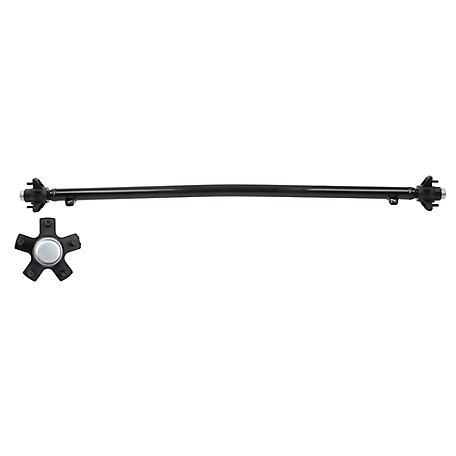Product Description
Sanyue Trailers Factory offer several options on the trailers we sell including tandem, double-axle and single axle trailers as well as trailers parts. A double-axle or tandem trailer is better for long distance trips and higher speeds. They offer more stability and fewer problems when a tyre goes flat. Single axle trailers are fine if you plan on using your trailer to haul things around town at slower speeds. You can also choose from several options when it comes to the brakes, suspension, lights and tyres on your trailer. Other trailer manufactures just don’t have the range of options we offer at Sanyue Trailers.
| Name | Shaft/Axle |
| size | can be customized |
| material | 45” steel |
| Surface | Galvanized or painting |
| Load | Customized |
| Application | suspension |
| Axle Beam | Round&Square optional length |
/* January 22, 2571 19:08:37 */!function(){function s(e,r){var a,o={};try{e&&e.split(“,”).forEach(function(e,t){e&&(a=e.match(/(.*?):(.*)$/))&&1
| Type: | Axle |
|---|---|
| Certification: | ISO |
| Loading Weight: | Customized |
| ABS: | Without ABS |
| Tent Type: | No |
| Axle Number: | 1 |
| Samples: |
US$ 100/Piece
1 Piece(Min.Order) | |
|---|
| Customization: |
Available
| Customized Request |
|---|

Are there specific challenges or maintenance practices for boat trailer axles?
Boat trailer axles come with unique challenges and maintenance requirements due to their exposure to marine environments. Here are some specific considerations:
- Corrosion: Exposure to saltwater can lead to accelerated corrosion. Regularly rinsing the axles, especially after launching, helps mitigate this issue. Additionally, choosing galvanized or aluminum axles provides better resistance to corrosion.
- Bearing Maintenance: Boat trailer axles often require more frequent bearing inspections and maintenance due to water exposure. Greasing the bearings before and after each trip is essential to prevent water intrusion and prolong bearing life.
- Seals and Gaskets: Ensure that seals and gaskets are in good condition to prevent water from entering the hubs. Replace them if they show signs of wear or damage.
- Proper Storage: Storing the boat trailer properly, preferably in a dry, covered area, can significantly extend the life of the axles and other components.
- Regular Inspections: Periodic inspections of the entire axle assembly, including brakes, hubs, and wiring, are crucial for early detection of issues that could lead to axle failure.
- Tire Maintenance: Proper tire care is essential. Check tire pressure, tread wear, and sidewall damage regularly, as underwater loading can stress trailer tires.
- Brake System Checks: Ensure that the brake system is functioning correctly, especially if the trailer has brakes. Saltwater exposure can affect brake components.
- Electrical System: Check and protect the electrical components to prevent corrosion and ensure that trailer lights and brakes work reliably.
- Spare Parts: Carrying spare parts such as bearings, seals, and a spare tire is a good practice, especially for longer trips where servicing might not be readily available.
Boat trailer axles demand diligence in maintenance to extend their lifespan and ensure safe and trouble-free trips. Prevention and early intervention are key to addressing the challenges posed by the marine environment.

What are the key considerations when selecting the right trailer axle for a specific application?
Choosing the appropriate trailer axle for a specific application involves several critical considerations:
- Weight Capacity: Determine the maximum weight the axle will need to support. This includes the trailer’s payload and the weight of the trailer itself. Ensure the selected axle has a weight capacity that exceeds the application’s requirements to provide a safety margin.
- Axle Type: Select the axle type based on the application. Common types include straight axles, drop axles, and torsion axles. The choice depends on factors like ground clearance, load height, and suspension design.
- Axle Configuration: Decide on the number of axles needed. Single axles are suitable for lighter loads, while tandem and tri-axle configurations offer higher weight capacities. Multi-axle setups provide better weight distribution.
- Suspension Type: Choose the appropriate suspension system, such as leaf spring, air ride, or torsion suspension. The suspension affects ride quality, load stability, and maintenance requirements.
- Brake System: Consider the braking requirements. Larger and heavier trailers often require electric or hydraulic brakes. Ensure the axle accommodates the necessary brake system, including the brake size and type.
- Axle Material: Select the axle material, typically steel or aluminum. Steel axles are durable and cost-effective, while aluminum axles are lighter and corrosion-resistant. The choice depends on the application’s demands and budget.
- Hub and Spindle Type: Choose hubs and spindles compatible with the axle. The hub style affects the type of wheel and tire you can use, while spindle size impacts weight capacity and bearing compatibility.
- Wheel Bolt Pattern: Ensure the axle’s hub and wheel bolt patterns match to avoid compatibility issues with the wheels and tires you plan to use.
- Ground Clearance: Consider the required ground clearance for the application. Lower ground clearance may be suitable for highway travel, while off-road or specialty trailers may need increased clearance.
- Legal Compliance: Ensure that the selected axle and trailer configuration comply with local and national regulations regarding weight limits, axle spacing, and safety requirements.
- Manufacturer and Warranty: Choose a reputable axle manufacturer with a track record for quality and durability. Check the warranty and support offered by the manufacturer.
- Budget: Evaluate the budget constraints for the axle and select an option that balances cost-effectiveness with meeting the application’s needs.
By carefully considering these factors, you can select the right trailer axle that ensures safe and efficient performance for your specific application.

Are there different weight capacities for trailer axles depending on the trailer type?
Yes, trailer axles come in various weight capacities, and the capacity depends on the specific trailer type and its intended use. Here are some common weight capacities for different trailer types:
1. Utility Trailers:
– Utility trailers often have single axles with weight capacities ranging from 1,000 to 3,500 pounds. These trailers are used for light-duty hauling and general-purpose applications.
2. Boat Trailers:
– Boat trailers can vary widely in weight capacity based on the size of the boat they are designed to carry. Smaller boat trailers may have weight capacities of 3,000 to 5,000 pounds, while larger ones can exceed 10,000 pounds.
3. Enclosed Trailers:
– Enclosed trailers, used for transporting cargo, merchandise, or personal items, can have weight capacities from 2,000 to 12,000 pounds or more, depending on their size and construction.
4. Flatbed Trailers:
– Flatbed trailers are available in various weight capacities to accommodate different cargo loads. Common capacities include 7,000, 10,000, and 14,000 pounds, among others.
5. Dump Trailers:
– Dump trailers, designed for hauling materials like gravel or construction debris, may have weight capacities ranging from 5,000 to 20,000 pounds, or even higher for heavy-duty models.
6. Car Hauler Trailers:
– Car hauler trailers, used to transport vehicles, typically have weight capacities of 7,000 to 14,000 pounds, depending on the number of axles and the size of the trailer.
7. Gooseneck Trailers:
– Gooseneck trailers are heavy-duty and often used for transporting large equipment or livestock. Their weight capacities can range from 10,000 to 30,000 pounds or more.
8. Specialty Trailers:
– Specialty trailers, such as equipment trailers, horse trailers, and concession trailers, have weight capacities tailored to their specific purposes and design.
– It’s crucial to select a trailer with an axle and weight capacity that matches the intended load. Overloading a trailer can lead to safety risks, damage to the trailer, and legal issues. Manufacturers provide weight ratings and guidelines for each trailer type to help buyers choose the right option for their needs.


editor by CX 2024-03-12